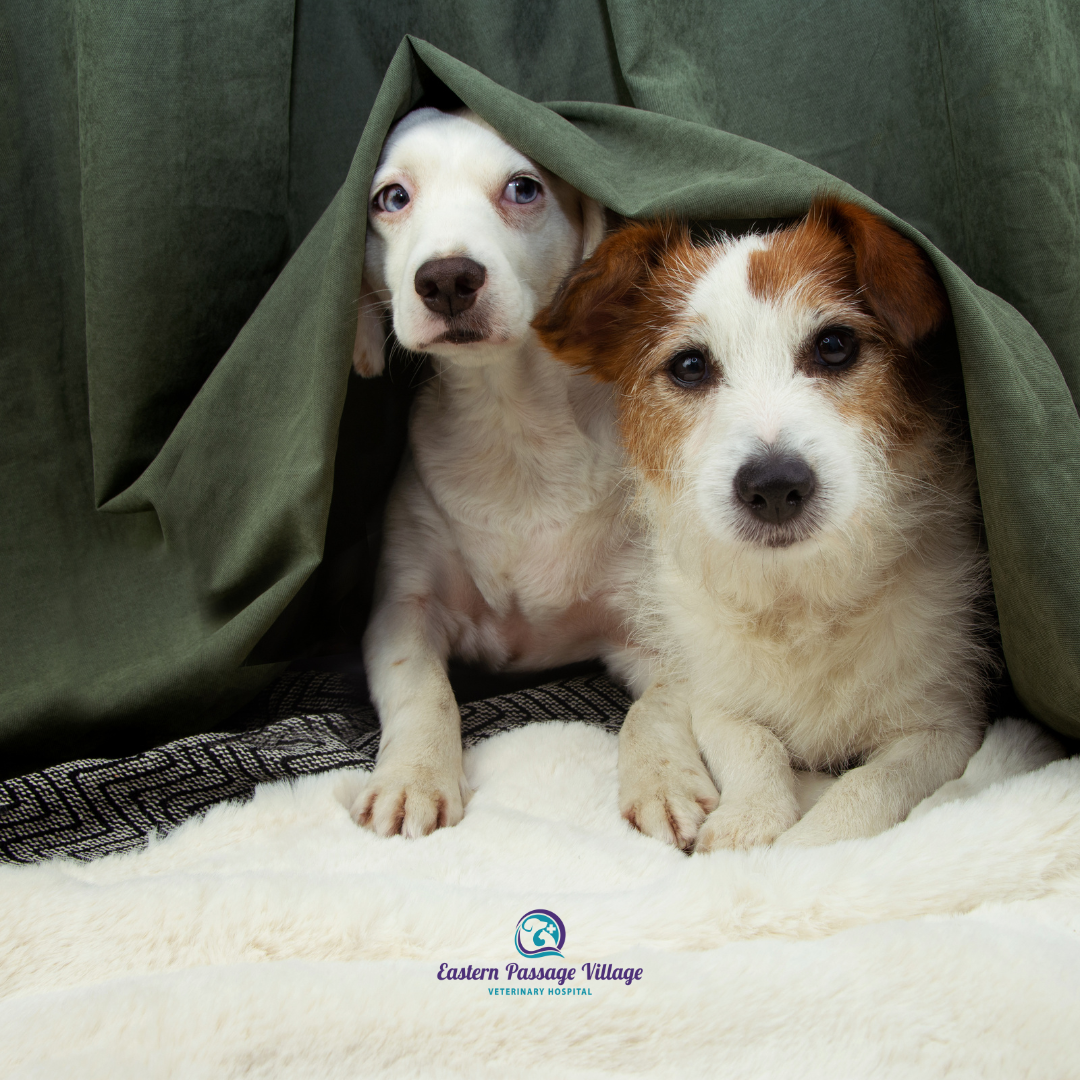By: Dr. Emma Bush

With the start of the summer months, we anticipate loud noises, whether that is due to firework celebrations, changing storm patterns and thunder, or even construction. Our pets react to such loud noises in a variety of ways: some can be completely unbothered while others can panic. This panic can manifest in a variety of ways: if pets are outside they can run away, becoming lost or having increased risk of being hit by a car and injured or even killed. If kept indoors, pets can display anxious behaviors that include, but are not limited to, pacing, panting, drooling, vocalizing, trembling, hiding, and even destructive behaviors and redirected aggression. How we address these fear signs can vary depending on the veracity of the signs, as well as the source of fear for the pet.
Though some common noise phobias have been listed above, an animal may develop a fear response to any noise: this can include, but is not limited to, dish washers, washing machines, TVs, traffic, music and doors slamming. The fear response can be caused by a variety of triggers, including negative experiences around certain noises (particularly if initially occurring during the developmental period of puppy or kitten-hood); as well as underlying illnesses, both physical and mental. For example; generalized anxiety may contribute to an overall fearfulness in our pets. Pain can also contribute to noise sensitivity. Additionally, senior pets with partial hearing loss may have an altered perception of noises and this can also contribute to fearful responses.
What can we do about fear and fearful behaviors in our pets secondary to loud noises and storms?
A first course of action for a fearful pet is considering behavior modification and drug-free options.
This can be as simple as keeping your pet in a safe, quiet space, or even crated if your pet feels safe in that space. This safe space must be accessible even no one is home as, especially with summer storms, phobia inducing sounds can happen at any time and can be unpredictable. Closing the curtains to limit stimulation from light of lightning or fireworks; and employing white noise such as playing TV or music to decrease the impact of sound from thunder or fireworks can work for some pets. Distractions such as high-value toys, treats or food in this space (such as frozen peanut butter in a Kong toy of lick matt – something to act as an ongoing distraction) can also be quite effective for some pets.
(If you have to take your dog outside during a time where loud noises are ongoing; keep them on a leash to minimize the risk of them running away in fear. Tags and collars can get lost; so it is always a good idea to have your pet microchipped out of an abundance of caution if they were to run away).
Synthetic pheromone sprays such as Feliway for cats and Adaptil for dogs can also be considered. These sprays or diffusers release the natural pheromones that a nursing female would release. This can be quite calming for certain pets.
Thunder-shirts and anxiety wraps are other options – these are tightly fitted shirts for dogs or cats – the pressure of which can have a calming effect for some pets.
Unfortunately, not all pets respond so well to these methods and, for some pets, medications are recommended. There is no cure-all medication for storm and/or noise phobias; however, certain behavior medications, when used in concert with the behavior modifications listed above, can make a difference for an anxious pet.
These medications can include short term anti-anxiety or short term sedation medications – these are good for dogs who are normally not fearful, but are afraid of certain situations such as fireworks or thunderstorms as listed above. However, for the very anxious dog who is fearful and impacted on a daily basis, long-term, daily medications may need to be considered. Decision making around these medications should be done in concert with your veterinarian for the best welfare of your pet. If your pet is severely fearful; your veterinarian may also recommend working with trainers or behavior specialists.
If you have any questions or concerns about noise and/or storm phobias, behavioral medications,
or behavior concerns in general, please contact your veterinarian.
Resources Used:
- Fear of Noises in Dogs and Cats:
https://veterinarypartner.vin.com/default.aspx?pid=19239&catId=102901&id=9925149#:~:text=Many%20factors%20can%20contribute%20to,sounds%20may%20cause%20strong%20reactions. - Storm and Other Noise Phobias:
https://veterinarypartner.vin.com/default.aspx?pid=19239&id=10753334 - Fear of Noises in Dogs:
https://vcacanada.com/know-your-pet/fear-of-noises-and-places-in-dogs - Fireworks Fear in Pets:
https://veterinarypartner.vin.com/default.aspx?pid=19239&id=4952947 - Cat Behaviour Problems: Aggression Redirected
https://vcacanada.com/know-your-pet/cat-behavior-problems-aggression-redirected
